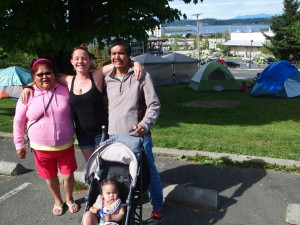
Tent-in Protest Overcomes Barriers to Services in Campbell River

The tents set up on the lawn of the Campbell River City Hall looked like a tent city, and the space served as a tent city for about 20 homeless people, but it was more a tent-in protest for services than a spontaneous survival space established by homeless people. Krisandra Rufus from the volunteer organization Grassroots Kind Hearts founded the tent city to protest the fact that her organization’s five-day-a-week food service for homeless people had nowhere to serve. Her main demand was for the city to allow a 24-hour drop-in, sobering centre, and year-round shelter and tenting site when Campbell River’s cold-wet weather shelter closes at the end of June. However, folks who are homeless have flocked to the tent city to dodge the daily displacement of tenting under the harassment of police and bylaw officers.
In early 2015 Krisandra started Grassroots Kind Hearts after she lost four family members on the street. She decided to start serving food to homeless people because her nephew was on the street and one night her husband took food to him where he was camping. “He saw there were a lot of friends and family in the same situation, so I started trying to make food for them all.” She says she needed her own organization, run primarily by and for Indigenous people like herself, because some church services “treat people like it’s residential school. They call people names and say they’re bad. I don’t think it will ever change, it’s just how they treat Natives. They can’t understand that our people feel so much trauma.”
Many shelters and low-income services in Campbell River are run in ways that mean many homeless people can’t access them. One homeless woman at the tent-in explains, “They search you when you come in the door. Women have to turn up their bras to show they don’t have anything hidden. They make you pray before you can eat and the food is so bad. But if you bring your own food into the shelter they kick you out. And they don’t allow you in if they think you’ve been drinking.”
One man who has been homeless for a couple years and has felt unable to overcome the barriers of other shelters valued the different sorts of structure and rules of the Grassroots Kind Hearts tent-in protest. Krisandra doesn’t allow drinking or drugs inside the camp, but she has built a warm community that includes people even if they do drink. “Living out in the bushes alone, I’d wake up, walk to the beer store, get a six-pack, and just think – why bother?” he said. “But here there’s companionship. There’s kids around all the time. If I killed myself I would hurt so many other people. The tent city gives me a reason to live.”
On May 6th, Grassroots Kind Hearts wrapped up the tent-in protest because the city promised to work with them to establish services that are lower-barrier and oriented towards Indigenous people on the street. In a statement after taking down the tent city Krisandra and Lynn from Grassroots Kind Hearts said, “We were incredibly sad to have left those that still do not have a place to call home because we knew what these past five weeks meant to many – a home means so much.” For those homeless still on the streets, Campbell River has gone from zero-tolerance for tenting to passing a bylaw conforming to the Supreme Court ruling allowing camping between 7pm and 9am. Krisandra is hopeful that the possibility of opening their drop-in and shelter centre will be an important step in the fight to end homelessness in this small Island community.
